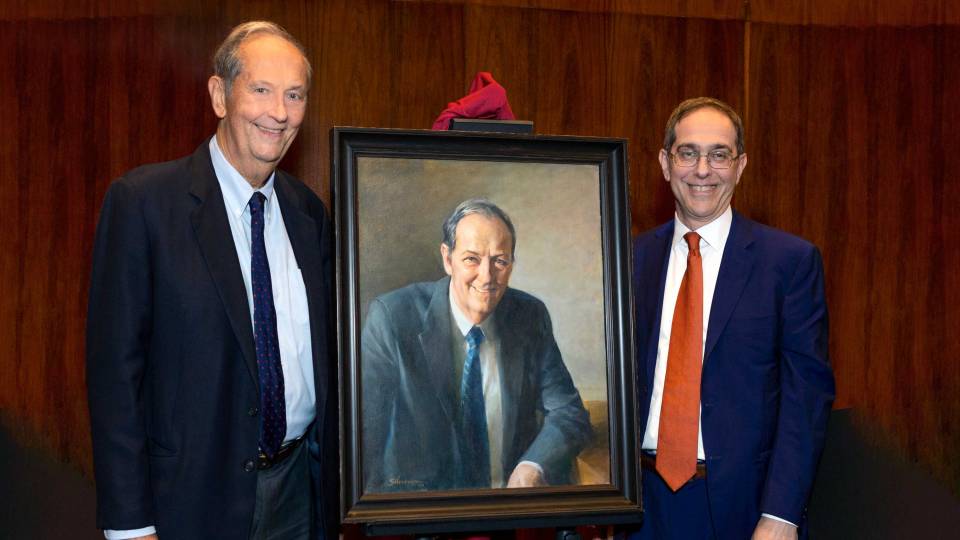Drawing on experiences from his undergraduate days at Princeton through his U.S. Senate tenure and his run for the presidency, Bill Bradley emphasized the values of honesty and honor in the keynote address of the University's first "Assembly on Integrity" on Sunday, Sept. 21.
Speaking to students who gathered on the lawn and in bleachers on Cannon Green in the evening darkness, Bradley urged them to use the signing of Princeton's Honor Code as the starting point for making the right decisions when faced with inevitable ethical quandaries throughout their lives.
"Honor and integrity are more than the single rule 'Don't steal.' They might start there, but their application has much greater breadth. As you go through life, I promise you, you'll be tested often," he said.
Princeton students -- reacting to reports of increasing Internet plagiarism and widespread corporate scandals -- created the assembly to encourage their peers to rededicate themselves to the principles of the University's honor system. For many years in the past, Princeton freshmen gathered for an honor assembly in the fall. Seeking to give the old tradition a broader audience, the new integrity assembly was open to all students, as well as faculty, staff and local community members.
In introductory remarks, President Shirley M. Tilghman noted, "It is critically important that we take full responsibility for our own ideas and that, when we draw on the ideas of others, we give credit where credit is due. As a close-knit residential community of students, faculty and staff, it is essential that honesty pervade our relationships with one another."
In his address, Bradley stressed that issues of integrity have arisen in every field he has chosen since graduating from Princeton in 1965. The Rhodes Scholar played professional basketball for the New York Knicks, represented New Jersey for 18 years in the Senate, unsuccessfully challenged Al Gore for the Democratic presidential nomination in 2000, and has been a published author and a businessman.
"You'll need your moral compass long after you've signed your last honor pledge at Princeton. It takes a lifetime to build a reputation and only one false step to call it into doubt," Bradley said.
Under Princeton's honor system, established by undergraduates in 1893, students assume full responsibility for honesty in written examinations. Upon entering the University, they must agree in writing to abide by the condition of the honor system. On examinations, which are not supervised by faculty, students must write and sign a pledge that they have not violated the Honor Code. Students also are asked to abide by other academic regulations designed to safeguard the integrity of scholarship on out-of-class exercises such as term papers, laboratory reports and problem sets on which they sign a similar pledge.
"Princeton hopes that your experience will contribute to your intellectual growth and also provide you with the experience of how it feels to be a part of an honorable community," he said. "Over time, only you can make the larger and more personal ethical decisions. It is my hope that you will make them in a way that will allow you to sleep very well every night."
Bradley's address was preceded by remarks from senior Liz Biney-Amissah and John Fleming, the Louis W. Fairchild '24 Professor of English and Comparative Literature, who has served as a faculty adviser to the Undergraduate Honor Committee.
Biney-Amissah, who is majoring in molecular biology, told her peers, "To know that the work is your own, whether it's a problem set, a lab report, a paper or a project, should be the most gratifying and genuine feeling you should have. It is your responsibility to use all of your capabilities to complete the assigned task with the utmost honesty, truth and candor."
Fleming noted that the need for academic integrity should go without saying, but that the student-initiated assembly was useful in the current environment. Explaining that his task was to provide remarks that were "profound yet light-hearted, wise, amusing, elegant (and) grave," Fleming offered sound advice to Princeton students: "Integrity is an excellent thing. You should all have it. If perchance you lack it, you should get it as soon as possible."
Contact: Lauren Robinson-Brown (609) 258-3601




